Photography by Carlos Amoedo and Scott Cook
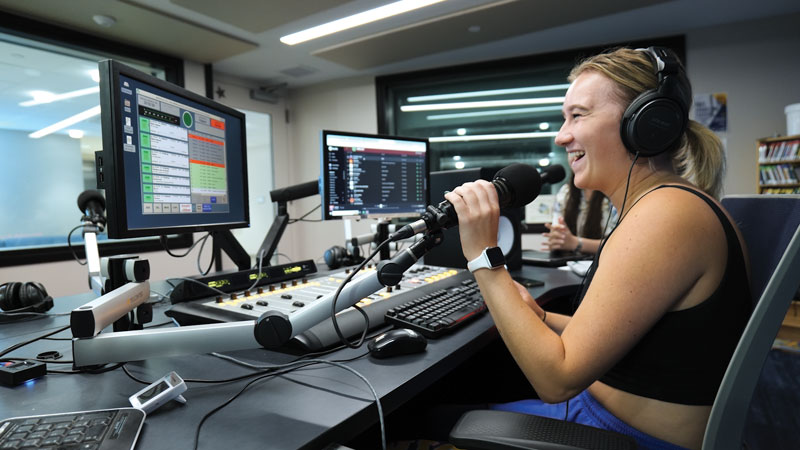
In a recent Instagram video for WPRK-FM, the Rollins College radio station, Personnel Director Brendan Manning and Marketing Director Madi Colpits drove a golf cart around the verdant campus to playfully pose this question to passersby: “What does WPRK stand for?”
The apparently not-so-obvious answer is “Winter Park.” The W is for “Winter” and the PRK is shorthand for “Park.” But among those asked, mostly students, the question elicited comedic squirming, blank faces, embarrassed giggles and off-the-wall guesses — among them “Winter Park Roller Koaster [sic].”
Yet the student-run station, which can be found at 91.5 on your dial, celebrated its 70th anniversary last December. And for this platinum milestone, it’s worth remembering that the “Voice of Rollins College” also speaks to the entire city via its small but spunky 1,300-watt signal — and to the entire world through various streaming platforms.
Best of all, and with all due respect to National Public Radio’s long-running morning program, it’s only at WPRK where all things really are considered.
A survivor among the dwindling number of free-form radio stations in the country, WPRK touts itself as the “Best in Basement Radio.” That slogan — counterculture implications notwithstanding — happens to literally be true: The station was launched in 1952 from an isolated studio in the depths of the former Mills Memorial Library (later Mills Memorial Hall and now Kathleen W. Rollins Hall).
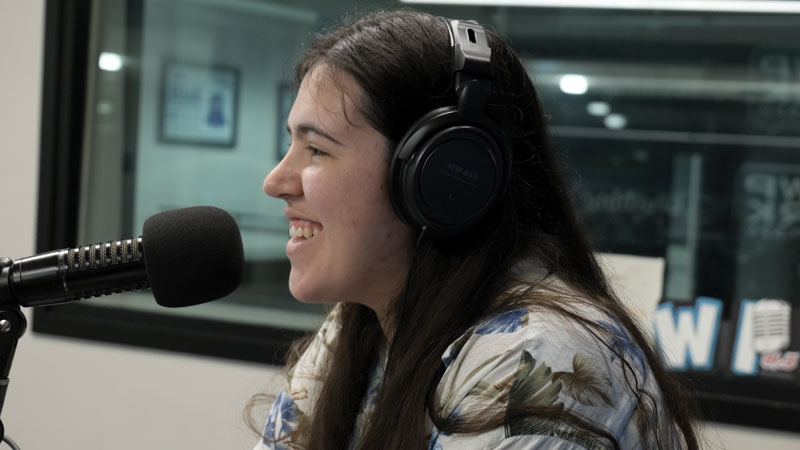
Today, WPRK might be considered Winter Park’s alter ego: edgy, earnest, passionate, pluralistic and proudly unpolished. Its programs combine news, talk and an eclectic mix of musical genres that no commercial station could — or would — dare present.
It’s almost as though the various program hosts — an impossible-to-categorize mixture of students and community members — had never heard the terms “format” and “demographics” — or, more likely, had simply chosen to disregard them.
Which is, of course, what makes WPRK so much fun.
Today the station streams its content, boasts its own app and produces several podcasts. It has evolved from limited airtime to a 24/7 broadcasting schedule. And three years ago, it moved to a state-of-the-art studio — on the first floor, not the basement — in the renovated and repurposed building where it all began.
WPRK indeed has a storied history. When the station went live on December 8, 1952, listeners heard President-elect Dwight D. Eisenhower imbue the enterprise — whose 10-watt signal likely couldn’t be heard much beyond campus — with some lofty responsibilities:
“This new FM station of Rollins College can help to spread and advance the great ideas which keep men and women free. Whether the ideas come from the great music or poetry or other literature of the past, or from debates and reflections of today, the people of our country who are listening in will be the richer.”
Those words, although they carried particular resonance during the Cold War, still guide the station, says Greg Golden, 34, director of student media and a Rollins and WPRK alum who, during his undergraduate days, hosted a show devoted to video-game music called Flying High in the Mushroom Kingdom.
Golden adds that while the station doesn’t collect listenership numbers, it does take seriously Ike’s admonition to broadcast “ideas which keep men and women free.” That’s accomplished, in part, by “uplifting voices and artists that we wouldn’t necessarily hear on other stations.”
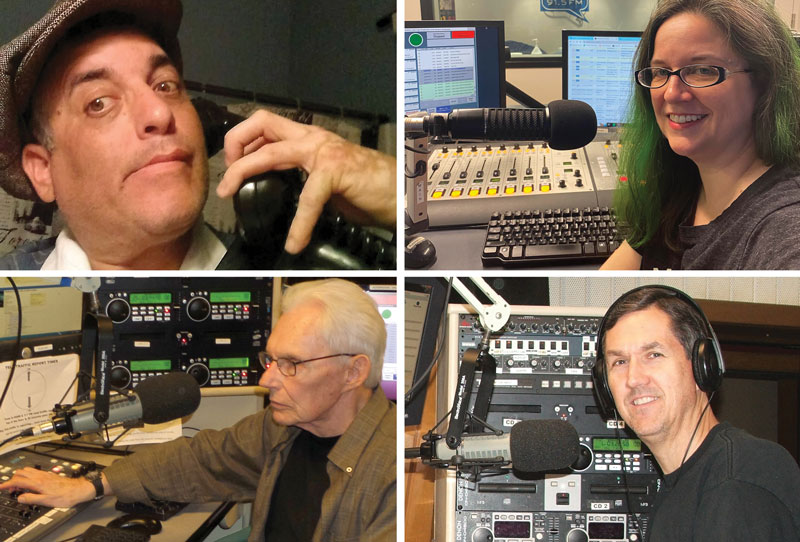
Eisenhower, who enjoyed military instrumental and vocal ensembles and hosted White House concerts by Guy Lombardo and Arthur Rubinstein, probably wouldn’t dig much of the music played on WPRK today. But he would have to admit that the programs do reflect “the people of our country” (and the globe) in all their glorious diversity.
WPRK currently broadcasts 52 different weekly shows — more than 75 percent of them featuring music that encompasses blues, jazz and reggae as well as hip-hop, polka and punk rock. Electronica is represented, as are musical scores from Hollywood and Bollywood.
When there’s no live DJ on the air, listeners are served heaping helpings of mostly alternative rock curated by the station’s music director and staff. And it’s not unusual to hear live music performed in the studio by local artists. In addition, WPRK boosts up-and-comers through campus concerts such as the Fox Fest, which takes place during the college’s annual Family Weekend.
No wonder this tiny station with a big mission won second place in Orlando Weekly’s 2022 Reader’s Choice Awards for Best Local Music-Focused Radio Station, finishing behind only iHeartMedia’s WXXL-FM (XL 106.7), a 100,000-watt Top 40 powerhouse.
Programming Potpourri
“Through all the changes, WPRK has remained a voice for our city, and a reminder that there is a local scene,” says Frankie Messina, 61, host of Apartment E Live, which was founded 12 years ago under the name State of the Scene by local music promoter Jessica Pawli. “WPRK’s diverse programming provides an amazing gauge of our incredibly creative city.”
Apartment E Live airs Thursdays from 5 to 7 p.m. Messina, host for the past four years, has been a full-time waiter at Walt Disney World and an ubiquitous promoter of artists and cultural causes in Orlando for 30 years. He adds: “This station gives me the opportunity to showcase locals I love. WPRK is like a vehicle we can all get in and ride to beautiful, creative places.”
Carson Holmes Boring and Julia Derkowski, who’ll graduate from Rollins this spring, have hosted Rise and Shine under the pseudonyms Snapdragon and Blu on WPRK since their freshman year.
Derkowski (Blu) hails from Chicago, where her father works for Warner Records. She was gung-ho to do a show after persuading her friend Holmes Boring (Snapdragon), an anthropology and Spanish double major from St. Petersburg Beach, to join her at a WPRK informational meeting.
Recalls Holmes Boring, who confesses to have been terrified at the prospect of becoming a disc jockey: “This was the first time I really dove into something without knowing how to do it.”
Rise and Shine first aired in the wee hours, from 3 to 5 a.m. on Saturdays, but has graduated through the years to more civilized hours, most recently from 7 to 9 a.m. on Wednesdays. At press time, the time slot had changed again, to Tuesday’s from 1 to 3 p.m.
Although their show is now in the afternoon, Derkowski and Holmes Boring are holding fast to the Rise and Shine title, which was inspired by a viral video during which Kylie Jenner shakily serenades her baby daughter with the chirpy children’s ditty. The hosts sing it, too — with somewhat more style — at the beginning of their broadcast.
The broadcasting buddies, both 22, have also kept their individualistic approach to song selection, which Holmes Boring cheerfully calls “music chaos.” They each plan one hour of the program, with Derkowski playing current music and Holmes Boring playing “everything from Disney songs to old country to pop — anything that I like.”
Derkowski, a business management major, adds: “We’re lucky that the station allows us to play the music that we like to play. That allows us to show our own musical taste to the school.”
Neither has any idea who listens, other than their parents. And Holmes Boring plans a career involving environmental activism, not radio or any other media. Nonetheless, she describes her experience at WPRK as “one of the amazing things I have done since I’ve been there.”
Maggie Finley, 45, a Rollins alumna, has hosted Punk Rock in Your PJs since 1999, the year she graduated. A librarian by day, she began training at WPRK in 1997. Her show airs from 11 p.m. to midnight on Tuesdays — except in the case of global pandemics.
Finley realized just how much the station meant to her during the COVID-19 shutdown, when there were no live broadcasts for 18 months. While listening to another radio station, she heard her show’s theme song, “Beat on the Brat” by the Ramones, and burst into tears, overcome with how much she missed her weekly on-air gig.
“I’m ridiculously grateful for the people who listen,” she says. “I have had random encounters with people, and it always feels so nice when someone shares that they enjoy the show. It absolutely makes my day.”
Finley’s memories of WPRK through the years include the controversial proposal in 2000 to have WMFE, a local NPR affiliate, take over the station. Although Rollins would have retained the broadcast license, WMFE would have installed new equipment, covered operating costs and provided student internships.
But the bigger station would also have reduced the hours available for student programming to make room for NPR-produced offerings. Passionate supporters, Finley among them, mobilized and formed an organization called “Save WPRK.com” to oppose the merger. Following a high-profile hubbub, college administrators opted to retain control.
When Bill Williams, now 84 and a former film and stage costume designer from New York City, became cohost of Music from the Movies in 1988, he recalls that he and show founder Don Mohler wondered if they had any listeners. “We put out a [phone] number and people started calling requesting music and movies,” he says.
Encouraged, the hosts began to invite feedback. For example, in a trivia contest they played composer John Barry’s “Romance for Guitar and Orchestra” from the1968 crime thriller Deadfall and asked if anyone out there in radioland could identify the film in which it was featured.
They figured that the lengthy instrumental — which was never a hit record — would be too obscure for anyone to guess. But listener Randy Ball called within a minute and had the correct answer. Shortly thereafter, Ball was invited to host, too, and has stayed ever since.
Moher left Florida in the 1990s and Williams — who still follows the show and lives in Winter Park — stepped away from the microphone following the pandemic hiatus. That left Ball, 67, to carry on WPRK’s oldest continuing program.
How big a fan is Ball of WPRK? Prior to the advent of streaming, he erected a 30-foot antenna at his home to get a clear signal from the station. A banker and a self-described introvert, he says he was “scared to death” when he hosted his first show. Now, though, he loves to talk about the music he has studied and appreciated through the decades.
And for all the WPRK milestones he has experienced — among them taking a call from a listener in New Zealand when the station first began streaming — Ball says the most significant for him was his first broadcast from the brand-new studio.
“I really felt like I was in a professional broadcast setting,” he says. “Yes, it may not have had some of the old charm and history of the basement. However, I prefer the new studio.”
Music from the Movies, which is broadcast from 2 to 4 p.m. on Sundays, is followed by Music from India with host Naval Modani, 74, a retired business professor at the University of Central Florida.
WPRK became home for Modani’s show after it had aired for a decade on WUCF-FM, which switched formats to 24-hour classical jazz in 1997. (Today WUCF and WMFE are both NPR affiliates.)
Through word of mouth, a niche audience has managed to find Music from India. Modani says that he has heard from listeners in Europe and across the United States. “But if there were no listeners, I would probably still do it,” he adds. “I have more fun than I deserve.”
The volunteer DJs at WPRK are passionate about their music and eager to share with an equally enthusiastic audience of kindred spirits, says Program Director David Palacios, 23, a Rollins music major who hosts Outside Space, a two-hour electronic music show on Fridays from 11 p.m. to 1 a.m. “You’re going to get a lot of value listening to music on WPRK,” he says.
Indeed, even the most knowledgeable musicophiles will find something new on the station, where the selections are curated and played by DJs who are as discerning as they are quirky and entertaining. “It’s more than you would get from streaming on Spotify,” adds Palacios.
Of the 52 programs on WPRK, 10 are talkfests that focus on everything from tourism to trivia to motor sports. On Rollins Around Town, Sam Stark, the college’s vice president for communications and external relations, interviews campus and community notables. The show airs on the first, second and fourth Wednesday of each month at 9 a.m.
Talk of the Town, a show also hosted by Stark that debuted in 2021, is a partnership between the college, the City of Winter Park and the Winter Park Chamber of Commerce. Stark’s regular guests include Mayor Phil Anderson and Chamber President and CEO Betsy Gardner Eckbert. The show airs on the third Wednesday of each month at 9 a.m.
On Our Seat at the Table: Leadership Lounge, which airs onFridays at 9 a.m., host Barbara Chandler, manager of the Hannibal Square Heritage Center, provides a forum for leaders in the Black community. Rollins Around Town, Talk of the Town and Our Seat at the Table are also available as podcasts through Apple, Google, iTunes and Spotify.
WPRK’s commitment to inclusion and social justice is reflected in several programs, including Out Loud Orlando! Homo Happy Hour, which airs on Tuesdays at 4 p.m. Hosts John Capo and Thom Bland discuss LGBTQ issues.
In addition, WPRK has amplified voices from underserved communities with live broadcasts from special events. In October, the station visited the
Eatonville Chamber of Commerce to celebrate a partnership with Winter Park’s Arts & Culture Alliance to paint planters and picnic tables. Mayor Anderson of Winter Park and Eatonville Chamber President LaVonda Wilder were among the guests.
The station also broadcasts all of Rollins’s men’s and women’s basketball games, which are called by students enrolled in the Dan Patrick School of Sportscasting at Full Sail University. Gus Ramsey, director of the sportscasting program, is a Rollins graduate who once called Tars’ matchups on WPRK.
“These kinds of things are what keep me doing what I’m doing,” says Golden, an English undergraduate who earned an MBA from the college’s Roy E. Crummer School of Business in 2016. “Community engagement is such an important piece of the education that happens at Rollins.”
Other WMFE offerings, as of January, include Tea Time with Brendan and Maddie, Classic Rock Breakfast Club and Rock en Español. There’s no telling what else you might find if you check out the programming schedule today.
Elevating the Spirit
Rollins’s grand experiment in radio began almost a century ago, in 1924, under the administration of Hamilton Holt. The eighth president of the college, who had been the publisher and editor of The Independent, an influential national weekly magazine, was eager to explore the potential of this relatively recent means of mass communication.
Professor Edward F. Weinberg and a group of physics students launched Central Florida’s first-ever radio station, 250-watt WDBO (Way Down By Orlando) from a dance studio on campus. But operational expenses proved prohibitive, and two years later the license was transferred to private owners and the operation moved off campus.
But WDBO — now at 580-AM — is still around. The 5,000-watt news/talk station, owned by Cox Communication Group, is now home to such right-wing luminaries as Sean Hannity, Brian Kilmeade and Dana Loesch. And it all started in a dance studio at a liberal-arts college where the president was a proud progressive.
Rollins, however, wasn’t finished with radio. After a hiatus of several decades, the college decided to give it another shot in 1951 thanks to donor William B. Calkins, a low-key local philanthropist who gave money for broadcast equipment to be installed in Mills Memorial Library.
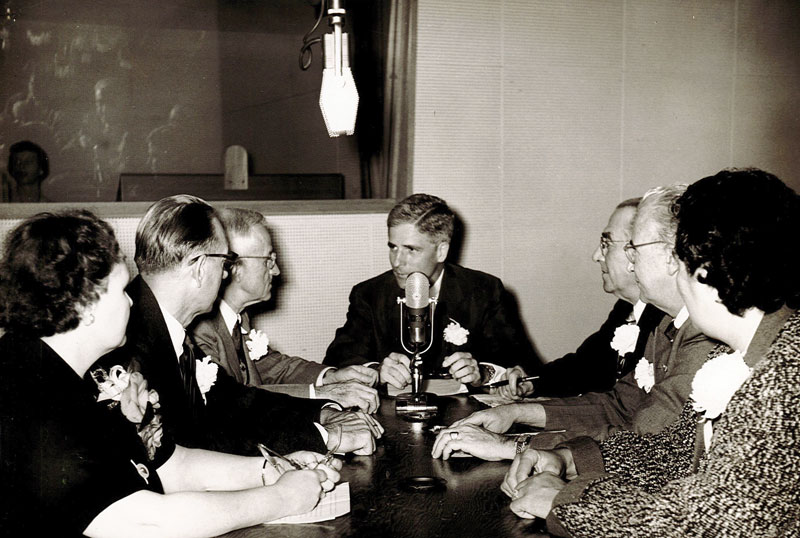
Then-President Hugh McKean, who had been a student under Holt, said at the time that Calkins was inspired by a wish to “enlighten young people with regard to the great spiritual joys and truths.” Consequently, trustees established the station with a mission to “be of such a nature as to raise the spiritual level of the college and the community.”
Again, the goals were ambitious, if difficult to quantify. But as college and community support increased — perhaps in part due to elevated levels of spirituality — WPRK was able to expand from its original 10 watts to 250 watts and then to 1,300 watts, where it remains.
Early programming was cultural and educational in focus. Listeners were likely to hear discussion panels, science talks, classical music and uplifting events such as the Bach Festival and the Animated Magazine, a forum established by Holt for public presentations from writers, thinkers, politicians and performers. Student DJs played what they were told to play.
The station began broadcasting seven days a week around 1964, and by the 1970s offered programming from noon to midnight. In the mid-1990s, when student control of the operation had been firmly established, the station shifted gears to a 24-hour broadcast day.
Never an aggressive fundraiser, WPRK has nonetheless managed to make a few headlines. In 2005, for example, DJ David Plotkin spent 110 consecutive hours on the air, almost breaking the Guinness World Record at the time and raising $16,000. With that financial boost, WPRK was able to launch online streaming the following year.
Several students who worked at WPRK have gone on to acclaim in the industry. These include Chris “Mad Dog” Russo of Sirius XM (Class of 1982); Jim Bowden of Major League Baseball’s Network Radio (Class of 1983); and Maria Paz Gutierrez of RadioLab (Class of 2015).
Superstar DJ and Grammy-winning dance music creator Diplo (Thomas Wesley Pentz), who was enrolled at the University of Central Florida in 1997, also hosted a show on WPRK. Diplo’s stint, however, lives on primarily in infamy.
As the story goes, he was fired for stealing records and finally fessed up in 2019 after Colin Brant, then the station’s program director, insisted via Twitter that he would “eat a picture of you every day until you respond to us on social media or return the vinyls.”
Behind the scenes, WPRK’s early operation was guided by professionals. Ben Aycrigg, who graduated from Rollins in 1949 and worked briefly as an announcer at WDBO — the station that had originated at Rollins before the license was transferred — became WPRK’s first program director in 1952.
Aycrigg went on to become a respected news anchor at Orlando CBS affiliate WKMG (previously WCPX), which became Orlando’s first TV station in 1954 when it, too, was known as WDBO. (Illustrating the axiom “what goes around comes around,” the same local company that took over the college’s broadcast license decades earlier also launched the TV station where Aycrigg would spend the bulk of his 35-year career.)
Later, the college’s then-President Thaddeus Seymour hired radio pioneer Gordon Fraser, who had retired to Winter Park in 1978, as general manager. Fraser had been a combat reporter during World War II and helped launch the NBC Radio Network’s groundbreaking weekend news program Monitor in 1955.
For more than a decade, Fraser deftly shaped the station with his enthusiasm, innovative ideas and professional knowledge. When he retired in 1990, however, students were ready to take the helm and petitioned the administration for greater control and increased hours of operation. The shift toward being student-run was complete.
When Fraser died in 2000, Susan Cohn Lackman — now a professor of music theory and then general manager of the station in addition to her academic duties — recalled the veteran newsman’s impact on students during an interview with the Orlando Sentinel.
Said Lackman: “Time after time, I would see a new student come to the radio station and the other students would say, ‘You’ve got to listen to this guy. He’s old, but he knows everything.’ It was a marvelous thing to see how the students loved him.”
Hurricanes and Pandemics
The last few years have brought their share of challenges. In 2017, for example, WPRK was knocked off the air for 11 months when Hurricane Irma damaged its antenna. Programming continued, however, via streaming until repairs could be made.
In 2018, as Mills Memorial Hall underwent its $17 million renovation and subsequent name change, the station was relocated off the main campus to another college-owned building. Operations continued unabated from temporary quarters — but the biggest challenge was yet to come.
WPRK moved back into its new-and-improved digs in January 2020. The elation didn’t last long, however, as COVID-19 erupted shortly thereafter. Consequently, WPRK had no in-studio shows from March 2020 to November 2021.
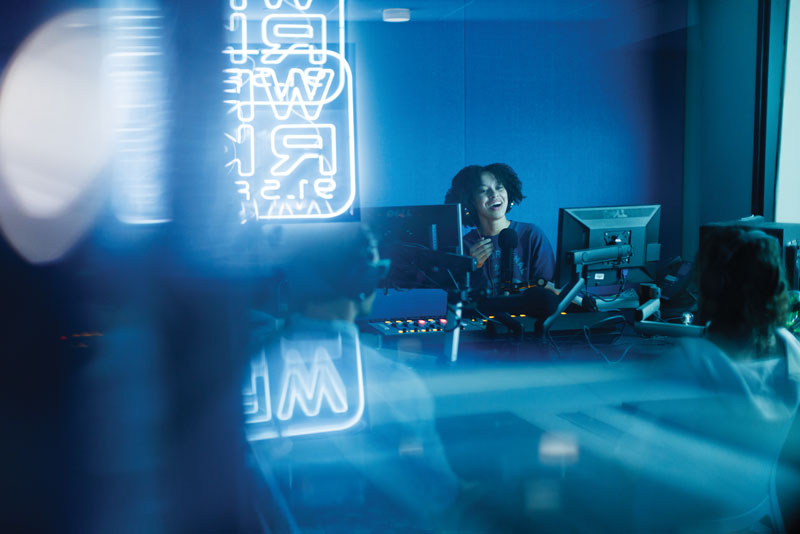
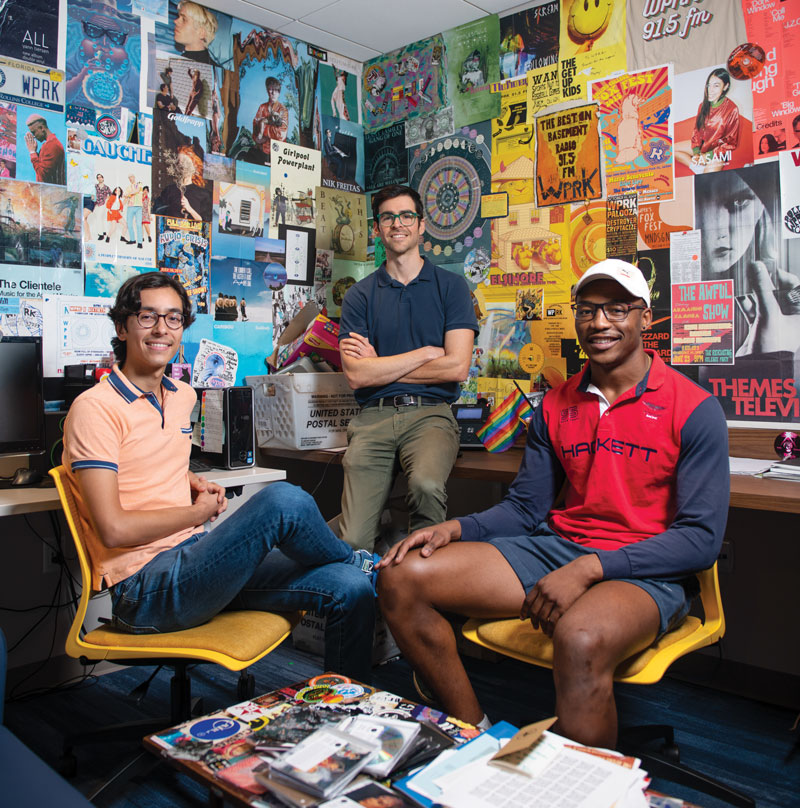
A few hosts had the know-how to record their programs and email them to the station. But, overall, the environment was surreal as the campus locked down and learned to cope with a strange and unsettling new reality for which the duration was unknown and unknowable.
Of course, something resembling the pre-pandemic status quo did, eventually, return. But, in the aftermath of the crisis, the station is still rebuilding its roster and its listenership. The number of weekly shows had been as high as 80 or more. Of the 50-plus shows on the air now, just 10 are currently hosted by students.
On any given day, during the prime listening hours of 7 a.m. to 11 p.m., 25 percent of what you’ll hear is automated alternative rock. “We’re far from where we need to be,” Golden says. “We need to have DJs on the air 24 hours a day. That is what we’re meant to do.”
But even automated music marks progress for the station. When Golden took over supervision in 2014, there was no capability for automation; listeners got either a live DJ or dead air. Prerecorded playlists were introduced in 2015 and, during COVID-19 downtime, the station took the opportunity to beef up the selection.
Still, it’s a pivotal time in the history of radio in general and a host of financial issues are impacting college radio in particular. With streaming options and the popularity of podcasts, radio listenership is declining, according to Pew Research. Some 83 percent of Americans over age 12 listened to radio at least once a week in 2020 — down from 89 percent in 2019.
Radio engagement is lowest among young people, according to the 2022 Jacobs Media Tech Survey reported by Radio Ink. In one telling statistic, Bluetooth is now rated as more important to new-car buyers than FM radio. Really? Could car radios go the way of CD players and cassette decks before that?
In truth, nobody knows. In view of these trends and rising operating expenses, college stations have been selling off or leasing their frequencies in the last decade. Among those doing so include Vanderbilt University, Georgia State University, Purdue University and numerous small colleges.
Those courting the colleges for these valuable noncommercial frequencies — always on the left-hand side of the dial between 87 and 92 MHz — are often large NPR affiliates eager for satellite signals, a trend presaged by WMFE’s pursuit of WPRK more than two decades ago.
But fast-forward to WPRK’s platinum anniversary year. The station has the firm support of campus leadership, including President Grant Cornwell, who provides a live state-of-the-college interview over the campus airwaves at least twice a year.
He says WPRK provides learning opportunities that can’t be found elsewhere and doesn’t measure the station’s value by listener numbers or ratings. Notes Cornwell: “A radio station is a place for creative expression, which is part of a liberal education.” Besides, he adds, “it’s some of the most interesting radio around.”
Rollins provides $45,000 annually for the operation of the station. This supports 15 paid part-time student positions, two part-time operations assistants — both held by alums — and one part-time engineer who puts in fewer than 10 hours a month. With no organized fund drives or sponsorship promotions, the station receives less than $5,000 annually through community contributions.
As WPRK looks to its future, it’s clear that more community support could help, says Station Manager Musenya “Muse” Ngoma, a 24-year-old international student from Zambia. Ngoma, a computer science major, wants the station to stay on top of new technologies.
With the Rollins student body in mind, Ngoma developed an app to allow fans to listen to the station’s broadcasts and podcasts from anywhere at any time. The app launched a year ago. “It was always about getting WPRK to the next level,” he says.
With recent disruptions behind them, WPRK managers have every hope that student engagement can be increased, that new hosts can be recruited, that more remote broadcasts can be held and that the station can fully reconnect with the niche audiences that it seeks to serve.
Ngoma is now compiling data that could be presented to potential donors or sponsors to demonstrate the impact that WPRK has in the campus community and beyond. Although the station has only anecdotal evidence of listenership, other measures of success exist, including social media followers and music downloads from the station’s website, wprk.org.
WPRK leaders acknowledge the challenges of changing trends and of marketing a station with such widely varied content. First and foremost, how does anyone know to tune in to a show if they don’t know it exists? Moving forward might take more money, says Ngoma.
“As staff members, we try to be innovative and creative to find other ways in which we can raise this money,” he adds. “We want to see this place do better for the next generation of students that come through.”
But nobody with a heart for music and conversation could fail to find something on WPRK that accomplishes the mission set out by college trustees 70 years ago. If you’ll just give this free-spirited station a try, Rollins is betting that you’ll still feel your spiritual level rise.
